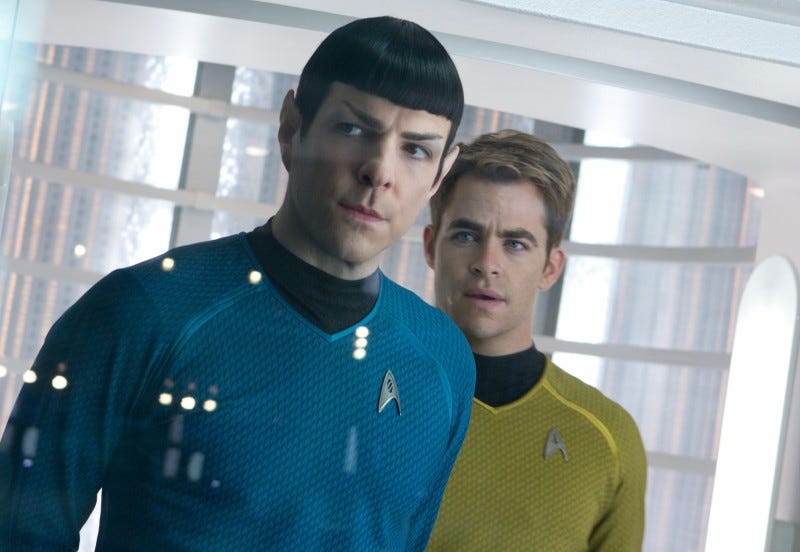Star Trek Into Darkness

There's an old Romulan proverb that says there are two types of people in the world: “Star Trek" fans, and non-“Star Trek” fans.
I fall into the former category, and that particular bias will undoubtedly color my review of “Star Trek Into Darkness,” the sequel to J.J. Abrams’ 2009 reboot of the “Trek” franchise. Forgive me for doing so, but I admit I am utterly incapable of separating that part of my being from viewing the film objectively.
I will say this, as an unabashed lover of Abrams’ first film, warts and all. It had the single greatest sequence in “Trek” movie history, which only included one of the main characters in a tertiary role, and had the spirit of cowboy gusto that frankly had been missing from the franchise since … well, William Shatner’s five-year mission ended prematurely in 1969.
“Into Darkness” isn’t as good as that first picture, but it recaptures some of that bottled lightning nonetheless and takes a few pretty bold risks along the way, continuing to both distance and connect itself to the original series through its somewhat innovative decision to spin this series off as an alternate reality.
The details of "STID's" plot is something too good to spoil here. The film’s villain is John Harrison (Benedict Cumberbatch), though that’s not his real name. Who he really is I won’t divulge, but will only say he is someone familiar to fans of the original series. Harrison is a terrorist of sorts who launches an attack against London, then attacks Starfleet Headquarters.
Captain Kirk (Chris Pine), on the other hand, finds himself in hot water, stripped of his captaincy and demoted for what is sure to be merely his first violation of Starfleet’s Prime Directive, which is to not interfere in the natural course of a civilization's evolution.
From there, things progress to the extent that the villains and heroes are established and do the things they do. There are thrilling, innovative action sequences, emotional interplay between characters (and a still somewhat-contentious relationship between Kirk and Spock), and enough surprises to keep you guessing (and believing) that anything can happen.
Pine and company continue to faithfully uphold Gene Roddenberry’s legacy for the most part, at least providing very good recreations of the characters, from Zachary Quinto’s wonderful twist on Spock to Simon Pegg’s pitch-perfect Scotty. Even Anton Yelchin breaks out his spectacular fake Russian accent again to great effect.
Pine, though, is perhaps at his best here, bringing an added layer of purpose and a rather shaky morality to Kirk. His youth both serves and betrays him, and he again stares down the proverbial lose-lose situation and comes up with another unique solution.
The film’s endgame could have used a little more tweaking, as the ship-to-ship dogfight leaves a little to be desired. But it ramps up into another “Trek” movie staple: the climactic fistfight, which is well done and ramps up the tension.
What Abrams has done so well with "Trek" is turn the series on its head while keeping it close to the source-material vest. In the first film, he dared to destroy Vulcan, one of the more important planets in the Federation in original “Trek” lore; here he…ha...good try. You almost got me to give away something. Let’s just say he takes established characters and turns our expectations upside down.
He also finds innovative ways to freshen up what had often become another stodgy “Trek” chestnut by creating new interactions with the ship. During battles, we don’t just get the usual camera shaking, console sparks and flying redshirts; here we get something of an homage to “Titanic,” as Kirk and Scotty (and the rest of the crew) hang on as the Enterprise pitches out of control, gravity lost and the ship plummeting toward a planet.
I do have nits to pick. First: Abrams gives Starfleet Navy-type hats to wear, which creates a thematic vibe but is not true to Roddenberry’s original vision (plus they’re dumb-looking). There are a few too many “the transporter can’t do this” moments that ring hollow and false, and there's at least one moment where the Enterprise should easily have been spotted by enemy combatants but inexplicably isn't. Scotty/Spock Prime's "Trans-Warp beaming" comes back into play, and it's a device that, if Abrams and writers Roberto Orci, Alex Kurzman and Damon Lindelof aren't careful, can create some unseemly plot holes.
Shrug all you want; we “Trek” fans are finicky, and we aren’t changing for J.J. Abrams or anyone else.
Overall, “Into Darkness” is neither a disappointing nor a surprisingly satisfying film. It’s rock-solid summer entertainment, a good film with a solid sense both of what it is and what it is not. Overall, I enjoyed the first film in the series more, but this one acquits itself well enough that I can say it’s a “Trek” well worth taking.


